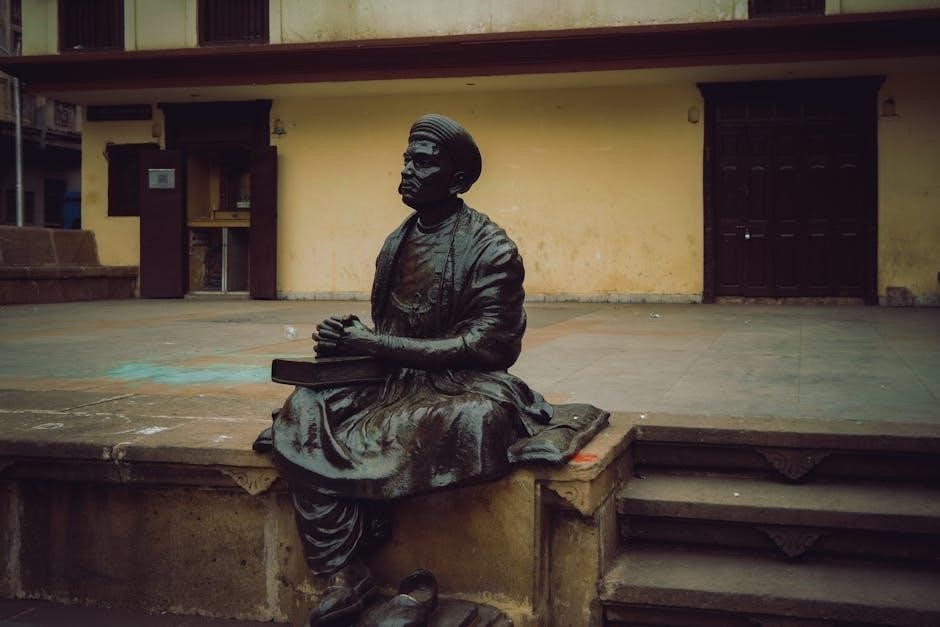The Poet X PDF: A Comprehensive Guide
This guide provides an overview of Elizabeth Acevedo’s “The Poet X‚” focusing on accessing the PDF version; It will explore the novel’s themes‚ characters‚ and significance within young adult literature. Resources‚ analysis‚ and discussion points related to the text are included.
Overview of The Poet X
“The Poet X‚” a young adult novel in verse by Elizabeth Acevedo‚ presents the coming-of-age story of Xiomara Batista‚ a fifteen-year-old Dominican-American girl living in Harlem. Published in 2018‚ it quickly garnered acclaim for its powerful exploration of identity‚ family‚ and self-expression. Xiomara‚ feeling unheard and constrained by her strict religious upbringing‚ discovers poetry as a means of navigating the tensions and conflicts in her life.
The novel is structured as Xiomara’s journal‚ revealing her innermost thoughts and feelings through raw and evocative verses. Acevedo draws upon her own experiences as a Dominican-American growing up in New York City‚ lending authenticity and depth to Xiomara’s struggles with her mother’s expectations‚ her burgeoning sexuality‚ and her search for her own voice. “The Poet X” juxtaposes Xiomara’s inner world‚ expressed through her poetry‚ with the persona she presents to the world‚ offering a complete picture of her complex character. The story highlights her journey towards self-discovery and empowerment through spoken word.

Elizabeth Acevedo: Biography and Influences
Elizabeth Acevedo‚ a Dominican-American poet‚ novelist‚ and performer‚ is the acclaimed author of “The Poet X.” Born in New York City‚ she is the youngest child and only daughter in her family. Acevedo’s upbringing and cultural heritage significantly shape her writing‚ lending authenticity and depth to her characters and stories. At 14‚ she participated in one of her first slam poetry events at the Nuyorican Poets Cafe‚ marking the start of her journey.
Acevedo earned a BA in performing arts from George Washington University and an MFA from the University of Maryland. She has taught poetry to teens and eighth-grade English‚ inspiring her to write stories that reflect the experiences of young women who often feel unseen in literature. Acevedo cites Dominican author Junot Díaz and Jacqueline Woodson as significant influences. Her work has received numerous awards‚ recognizing her talent and contribution to young adult literature and spoken word poetry. Acevedo currently resides in Washington‚ DC with her partner‚ continuing to write and inspire readers with her powerful voice.
Themes in The Poet X
“The Poet X” explores a multitude of powerful and relevant themes that resonate deeply with young adult readers. Identity‚ particularly in the context of being a young Dominican-American woman in Harlem‚ is central to Xiomara’s journey. The novel delves into her struggle to define herself amidst cultural expectations‚ familial pressures‚ and her own burgeoning desires.
Religion‚ specifically the conflict between Xiomara’s personal beliefs and her mother’s stringent Catholicism‚ forms another significant theme. Xiomara grapples with doubt and questions the doctrines imposed upon her‚ seeking her own spiritual understanding. Self-expression and the power of poetry are also prominent themes‚ as Xiomara finds solace and liberation through writing. She uses poetry to navigate her emotions‚ challenge societal norms‚ and ultimately discover her voice. The novel further explores the challenges of coming-of-age‚ including navigating relationships‚ dealing with unwanted attention‚ and discovering self-worth. Family dynamics‚ cultural identity‚ and the search for personal truth are interwoven throughout the narrative.

Xiomara Batista: Character Analysis
Xiomara Batista‚ the protagonist of “The Poet X‚” is a complex and compelling character whose journey of self-discovery forms the heart of the novel. As a fifteen-year-old Dominican-American girl growing up in Harlem‚ Xiomara grapples with numerous challenges related to her identity‚ family‚ and faith.
Initially presented as a young woman who feels unheard and unseen‚ Xiomara finds solace and empowerment through her writing. Her physical development and the unwanted attention she receives contribute to her feelings of vulnerability and frustration. She channels these emotions into her poetry‚ using it as a means of self-expression and resistance against societal expectations. Xiomara is portrayed as intelligent‚ introspective‚ and fiercely independent‚ questioning the religious doctrines imposed upon her by her devout mother. Her relationship with her twin brother‚ Xavier‚ provides a source of support and understanding‚ while her interactions with her parents reveal the tensions and conflicts within her family. As the novel progresses‚ Xiomara evolves from a silent observer into a confident and articulate young woman who embraces her voice and asserts her own identity.
Poetry as a Form of Self-Expression
In “The Poet X‚” poetry serves as a powerful and transformative outlet for Xiomara Batista‚ allowing her to articulate her innermost thoughts‚ feelings‚ and experiences. Faced with the challenges of adolescence‚ cultural expectations‚ and religious constraints‚ Xiomara turns to poetry as a means of self-discovery and empowerment. Through her writing‚ she is able to explore her identity as a young Dominican-American woman in Harlem‚ grappling with issues of body image‚ sexuality‚ and faith. Poetry becomes her sanctuary‚ a space where she can be honest and vulnerable without fear of judgment.
The novel showcases the evolution of Xiomara’s poetic voice as she gains confidence in her ability to express herself. From her initial journal entries to her participation in slam poetry‚ Xiomara uses language to challenge societal norms‚ question religious dogma‚ and assert her own agency. Her poems reflect her struggles‚ her joys‚ and her evolving understanding of the world around her. Poetry‚ in this context‚ is not merely an art form but a vital tool for survival and self-affirmation.
Religious Conflict and Identity
In “The Poet X‚” religious conflict is a central theme‚ intricately woven with Xiomara’s struggle to define her identity. Raised in a strict Catholic household by her devout mother‚ Xiomara grapples with the clash between her personal desires and the expectations imposed upon her. The novel portrays the tension between faith and self-discovery‚ as Xiomara questions the doctrines and restrictions of her religion‚ particularly regarding her emerging sexuality and her passion for poetry.
Xiomara’s religious conflict is not simply a rejection of faith but a quest for a more authentic understanding of spirituality. She seeks to reconcile her religious upbringing with her own beliefs and experiences‚ challenging the rigid interpretations of her mother and the Church. Through her poetry‚ Xiomara expresses her doubts‚ her frustrations‚ and her evolving relationship with God. This exploration of religious conflict is essential to Xiomara’s journey of self-discovery‚ as she ultimately forges her own path‚ embracing her identity as a young woman of faith while remaining true to herself.
Coming-of-Age in Harlem

The setting of Harlem is integral to Xiomara’s coming-of-age story in “The Poet X.” The vibrant and complex neighborhood shapes her experiences‚ influencing her identity and worldview. Growing up in Harlem‚ Xiomara navigates the challenges of adolescence within a community rich in culture‚ history‚ and the realities of urban life. The novel captures the sights‚ sounds‚ and rhythms of Harlem‚ from the bustling streets to the intimate spaces of family homes.

Harlem serves as both a backdrop and a catalyst for Xiomara’s personal growth. She confronts issues of race‚ class‚ and gender within the context of her neighborhood‚ encountering diverse perspectives and experiences. The pressures and temptations of the streets‚ the presence of drug dealers‚ and the constant threat of violence all contribute to the urgency of Xiomara’s search for self-expression and her desire to break free from societal constraints. In Harlem‚ Xiomara finds both inspiration and obstacles as she comes to terms with who she is and who she wants to become‚ making her journey deeply rooted in the unique environment of her community.
The Novel-in-Verse Genre
“The Poet X” exemplifies the novel-in-verse genre‚ a form that blends narrative storytelling with poetic expression. This structure allows Elizabeth Acevedo to convey Xiomara’s innermost thoughts and emotions through concise‚ impactful verses‚ offering a unique reading experience. Unlike traditional prose novels‚ the novel-in-verse relies on the white space‚ rhythm‚ and imagery of poetry to advance the plot and develop characters. Each poem acts as a snapshot‚ revealing fragments of Xiomara’s life and perspective.
The genre enhances the themes of self-discovery and self-expression‚ mirroring Xiomara’s journey as a poet. The use of verse creates a sense of intimacy‚ drawing readers into Xiomara’s world and allowing them to connect with her struggles and triumphs on a deeply emotional level. The poetic form also provides a platform for exploring complex issues such as identity‚ religion‚ and family dynamics with nuance and sensitivity. “The Poet X” contributes to the growing popularity of verse novels for young adults‚ joining titles like “The Crossover” and “Brown Girl Dreaming” in showcasing the power and beauty of this literary form. It’s a modern twist on ancient storytelling.
Awards and Recognition
“The Poet X” has garnered significant awards and recognition‚ solidifying its place as a vital contribution to young adult literature. Elizabeth Acevedo’s debut novel received the National Book Award for Young People’s Literature in 2018‚ a prestigious honor that acknowledges the book’s impact and literary merit. The novel was also awarded the Michael L. Printz Award‚ recognizing excellence in young adult literature‚ and the Pura Belpré Award‚ celebrating Latinx authors and illustrators whose work best portrays the Latinx cultural experience.
Further accolades include the Boston Globe-Horn Book Award and the Carnegie Medal‚ highlighting the novel’s widespread appeal and critical acclaim. “The Poet X” was also a New York Times bestseller‚ demonstrating its popularity among readers. These awards reflect the novel’s powerful storytelling‚ compelling characters‚ and exploration of relevant themes such as identity‚ faith‚ and self-expression. The recognition bestowed upon “The Poet X” underscores its importance in promoting diverse voices and experiences within the literary landscape‚ marking it as a significant work for young readers. It is a testament to Acevedo’s skill.
Critical Reception and Analysis
The critical reception of “The Poet X” has been overwhelmingly positive‚ with reviewers praising Elizabeth Acevedo’s powerful verse narrative and its exploration of complex themes. Critics have lauded the novel’s authentic portrayal of Xiomara’s struggles with identity‚ religion‚ and self-expression as a young Dominican-American woman in Harlem. Acevedo’s use of poetry to convey Xiomara’s inner thoughts and emotions has been particularly noted‚ with many reviewers highlighting the raw honesty and vulnerability of her voice.
Literary analyses of “The Poet X” often focus on its exploration of intersectionality‚ examining how Xiomara’s experiences are shaped by her race‚ gender‚ and cultural background. The novel’s examination of religious conflict and the challenges of navigating faith as a young person have also been widely discussed. Furthermore‚ critics have explored the significance of slam poetry as a form of empowerment and self-discovery for Xiomara. “The Poet X” is celebrated for its ability to resonate with young readers‚ offering a relatable and inspiring story about finding one’s voice and embracing one’s identity. The novel is a wonderful contribution.
Influence of Slam Poetry
Slam poetry profoundly shapes “The Poet X‚” serving as a vital catalyst for Xiomara’s self-discovery and empowerment. The novel beautifully illustrates how this dynamic art form provides Xiomara with a platform to articulate her innermost thoughts‚ frustrations‚ and aspirations‚ which she initially struggles to express within the confines of her strict religious upbringing and societal expectations. Slam poetry becomes her sanctuary‚ a space where she can freely explore her identity‚ challenge norms‚ and find her authentic voice.
Acevedo masterfully integrates the energy and rhythm of slam poetry into the novel’s verse structure‚ mirroring the protagonist’s journey of self-expression. Through her engagement with slam‚ Xiomara learns to harness the power of language‚ transforming her vulnerability into strength. This artistic outlet allows her to connect with a community of like-minded individuals‚ fostering a sense of belonging and solidarity. The influence of slam poetry extends beyond personal growth‚ enabling Xiomara to challenge societal injustices and advocate for marginalized voices‚ solidifying her role as a poet and activist.
The Poet X PDF: Availability and Resources
Finding a legitimate PDF version of “The Poet X” requires caution‚ as unauthorized copies may infringe on copyright. It’s recommended to explore official channels for accessing the digital text. Many online retailers‚ such as Amazon Kindle‚ Google Play Books‚ and Kobo‚ offer licensed ebook versions‚ which can be read on various devices. Your local library may also provide access to the ebook through platforms like OverDrive or Libby‚ often for free with a library card.
Beyond the core text‚ numerous resources enhance the reading experience. LitCharts and SparkNotes offer detailed summaries‚ character analyses‚ and explorations of themes. Educational websites and blogs frequently provide study guides‚ discussion questions‚ and critical essays suitable for students and book clubs. Remember to verify the credibility of sources to ensure accuracy and avoid plagiarism. Engaging with these resources can deepen your understanding and appreciation of Acevedo’s powerful novel-in-verse.
Discussion Questions for The Poet X
Engaging with “The Poet X” through discussion enhances comprehension and encourages critical thinking. How does Xiomara’s poetry serve as a form of rebellion against her mother’s strict religious expectations? Explore the ways in which Xiomara’s physical development shapes her experiences and interactions within her community. Consider the role of twinhood in Xiomara’s life and her relationship with her brother‚ Xavier.
Analyze the significance of slam poetry as a means of self-discovery and empowerment for Xiomara. How does Acevedo use verse to convey Xiomara’s emotions and experiences? Discuss the themes of cultural identity and belonging in the novel‚ particularly as they relate to Xiomara’s Dominican heritage and American upbringing. In what ways does “The Poet X” address issues of gender inequality and female empowerment? How does the novel depict the complexities of mother-daughter relationships? Reflect on the ending of the novel and its implications for Xiomara’s future. What lessons can be learned from Xiomara’s journey of self-expression and finding her voice?
